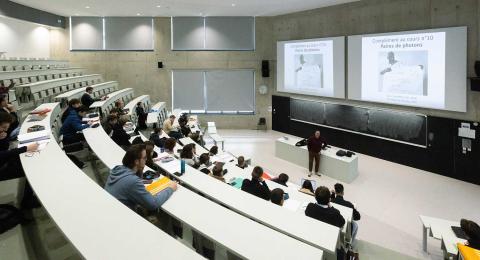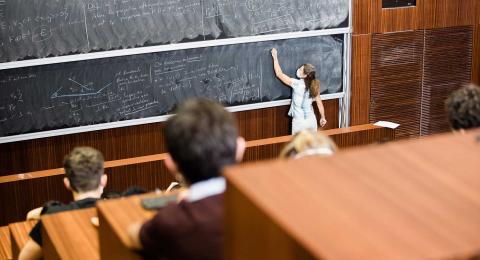The Master 1 in General Physics is the first year of the Master’s program in the Department of Physics at Université Paris-Saclay.
It is open to all international students, taught entirely in English, and offers a broad curriculum spanning high-energy physics and cosmology, quantum physics, statistical physics, soft matter, and condensed matter. A distinctive feature of the program is the flexible à la carte choice of courses. The courses are spread over two semesters.
Information
Skills
To master and apply specialized knowledge in physics, both fundamental and applied, with the required scientific rigor.
Objectives
After completing the M1 General Physics programme, students can apply for the second year of a Master's degree in Physics, specializing in either theoretical or applied physics, at Université Paris-Saclay or other universities.
The M1 General Physics programme provides students with essential skills, knowledge, and research capabilities for careers in modern physics fields, including particle physics, astrophysics, condensed matter, nanosciences, optics, and more, covering both experimental and theoretical aspects.
This programme also provides students with access to the world-class research environment at Université Paris-Saclay, including the numerous Physics Graduate School laboratories. It serves as a strong foundation for pursuing a Ph.D. in physics and meets the national and international demand for highly qualified postgraduates prepared for future developments in the field.
Fees and scholarships
The amounts may vary depending on the programme and your personal circumstances.
Admission Route
Capacity
Available Places
Target Audience and Entry Requirements
The M1 General Physics welcomes talented Bachelor's graduates who wish to deepen their knowledge of physics and pursue a research career in a university, an industrial or a public research laboratory. It is open primarily to physicists, but also to mathematics and engineering students, provided they have a solid background in fundamental physics (including quantum mechanics, statistical physics, special relativity and electrodynamics) and in mathematical tools for physics.
Application Period(s)
From 01/01/2026 to 06/07/2026
Supporting documents
Compulsory supporting documents
Referring contact information (compulsory for non-international applicants).
Motivation letter.
All transcripts of the years / semesters validated since the high school diploma at the date of application.
Certificate of English level (compulsory for non-English speakers).
Curriculum Vitae.
Detailed description and hourly volume of courses taken since the beginning of the university program.
Additional supporting documents
VAP file (obligatory for all persons requesting a valuation of the assets to enter the diploma).
Supporting documents :
- Residence permit stating the country of residence of the first country
- Or receipt of request stating the country of first asylum
- Or document from the UNHCR granting refugee status
- Or receipt of refugee status request delivered in France
- Or residence permit stating the refugee status delivered in France
- Or document stating subsidiary protection in France or abroad
- Or document stating temporary protection in France or abroad.
| Subjects | ECTS | Semestre | Lecture | directed study | practical class | Lecture/directed study | Lecture/practical class | directed study/practical class | distance-learning course | Project | Supervised studies |
|---|---|---|---|---|---|---|---|---|---|---|---|
| Plasma physics and applications | Semestre 1 | 24 | 24 | ||||||||
| Quantum Solid State Physics | Semestre 1 | 40 | 30 | ||||||||
| Subjects | ECTS | Semestre | Lecture | directed study | practical class | Lecture/directed study | Lecture/practical class | directed study/practical class | distance-learning course | Project | Supervised studies |
|---|---|---|---|---|---|---|---|---|---|---|---|
| Quantum Field Theory | Semestre 2 | 25 | 25 | ||||||||
| Soft Matter | Semestre 2 | 30 | 20 | ||||||||
| General Relativity & Cosmology | Semestre 2 | 30 | 20 | ||||||||
| Astrophysics and Astroparticles | Semestre 2 | 30 | 20 | ||||||||
| Nuclear and Particle Physics | Semestre 2 | 30 | 20 | ||||||||
| Macroscopic Quantum Phenomena | Semestre 2 | 30 | 20 | ||||||||
| Subjects | ECTS | Semestre | Lecture | directed study | practical class | Lecture/directed study | Lecture/practical class | directed study/practical class | distance-learning course | Project | Supervised studies |
|---|---|---|---|---|---|---|---|---|---|---|---|
| Universe | Semestre 1 | 16 | 12 | ||||||||
| Atoms, Molecules and Optics | Semestre 1 | 18 | 18 | ||||||||
| Particles | Semestre 1 | 19.5 | 12 | ||||||||
| Advanced Statistical Physics | Semestre 1 | 17.5 | 14 | ||||||||
| Nuclei | Semestre 1 | 16 | 15 | ||||||||
| Subjects | ECTS | Semestre | Lecture | directed study | practical class | Lecture/directed study | Lecture/practical class | directed study/practical class | distance-learning course | Project | Supervised studies |
|---|---|---|---|---|---|---|---|---|---|---|---|
| Experimental Physics | Semestre 1 | 50 | |||||||||
| Subjects | ECTS | Semestre | Lecture | directed study | practical class | Lecture/directed study | Lecture/practical class | directed study/practical class | distance-learning course | Project | Supervised studies |
|---|---|---|---|---|---|---|---|---|---|---|---|
| Mathematical and statistical methods: from big data to relevant information | Semestre 1 | 20 | 10 | ||||||||
| Laser Physics | Semestre 1 | 12 | 12 | 6 | |||||||
| Non-Linear Optics | Semestre 1 | 20 | 10 | ||||||||
| Language course | Semestre 1 | 24 | |||||||||
| Sensors, measurements, and signal processing | Semestre 1 | 12 | 12 | 6 | |||||||
| Subjects | ECTS | Semestre | Lecture | directed study | practical class | Lecture/directed study | Lecture/practical class | directed study/practical class | distance-learning course | Project | Supervised studies |
|---|---|---|---|---|---|---|---|---|---|---|---|
| Internship | Semestre 2 | ||||||||||
| Subjects | ECTS | Semestre | Lecture | directed study | practical class | Lecture/directed study | Lecture/practical class | directed study/practical class | distance-learning course | Project | Supervised studies |
|---|---|---|---|---|---|---|---|---|---|---|---|
| Quantum Matter | Semestre 2 | 16 | 14 | ||||||||
| Research project | Semestre 2 | ||||||||||
| Advanced mathematics for physicists | Semestre 2 | 20 | 10 | ||||||||
| Nanomaterials and Electronic Applications | Semestre 2 | 18 | 18 | ||||||||
Teaching Location(s)
Visit the website of the programme! All the details about the syllabus are available.










